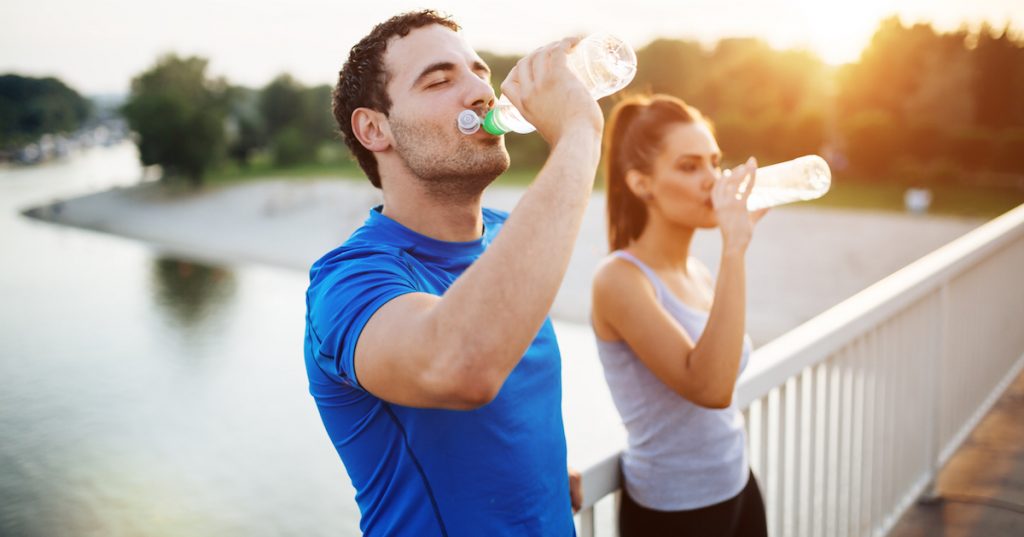
Our bodies are comprised of approximately 75% water—and virtually every system in the body relies on it in some way to function properly. When you don’t provide your body with enough fluids, you can start to experience signs of dehydration.
What Is Dehydration?
Dehydration is a condition in which more water and fluids leave the body than are taken in. Fortunately, our bodies have a sophisticated fluid management system to ensure that our water levels remain balanced.
For example, when we become even mildly dehydrated, such as after exercising, our thirst mechanism will tell us to increase our fluid intake to replace the fluids and electrolytes that were lost through sweating.
Those most at risk for experiencing dehydration include infants and children, the elderly, people with certain acute or chronic illnesses, individuals at high altitudes, and those who work or exercise outdoors in extreme heat.
What Are the Signs of Dehydration?
The first and most obvious symptom of dehydration is thirst. As the body tries to conserve fluids, you may notice that your urine output decreases and it becomes darker and more concentrated. At this stage, dehydration can usually be reversed by simply drinking more fluids.
In the moderate stage, dehydration symptoms typically include:
- Lethargy
- Dry mouth
- Dizziness
- Muscle weakness
- Headache
Severe dehydration, which occurs when the body loses 10% to 15% of its fluid volume, is characterized by extreme and potentially life-threatening symptoms, including:
- Sunken eyes
- Increased heart rate
- Lack of sweating
- Low blood pressure
- Dry or shriveled skin
- Confusion or delirium
- Unconsciousness
In babies, dehydration symptoms include a dry tongue or mouth, increased irritability, a lack of tears when crying, sunken cheeks or eyes, and no wet diaper for three or more hours. The fontanel, which is the soft spot on the top of the head, will also appear sunken. The elderly, especially those with dementia, may develop dehydration without feeling thirsty.
What Causes Dehydration?
A number of different factors can cause your body to lose more water than you consume:
- Illnesses that lead to prolonged diarrhea or vomiting can cause the body to excrete too much fluid.
- Long periods of time without drinking water.
- Vigorous physical activity or fever can lead to increased fluid loss through sweating.
- Chronic health conditions, such as diabetes, and certain medications, such as diuretics, can cause increased urination, which can lead to dehydration.
- Serious burns resulting in blood vessel damage can cause fluid to leak into the surrounding tissue.
What Are the Side Effects of Dehydration?
Without the proper dehydration treatment to reverse the fluid loss, dehydration can result in seizures, kidney and urinary tract problems, low blood volume, and heat injuries ranging from muscle cramps to heat stroke.
How Does My Healthcare Provider Determine If I Need Dehydration Treatment?
Dehydration is easily diagnosed based on the patient’s physical symptoms and recent activities. Urine and blood tests may be performed to assess kidney function and to measure the levels of potassium, sodium, and other electrolytes that are essential for nerve and muscle function.
What Does Dehydration Treatment Involve?
Mild dehydration can normally be remedied by consuming clear fluids, such as water or sports drinks containing electrolytes. It’s best to avoid tea, sodas, and other drinks with caffeine since these can exacerbate the problem. If the dehydration is accompanied by vomiting or diarrhea, over-the-counter medications can help to slow the fluid loss. Occasionally, prescription medications for nausea, vomiting and diarrhea may be necessary and in extreme cases, treatment may involve the administration of intravenous fluids.
How Can I Prevent Dehydration?
The best way to prevent dehydration is to drink plenty of clear fluids and eat foods with a high water content, such as fruits and vegetables. In most cases, drinking water when you’re thirsty and making sure that your urine is pale and diluted is sufficient to prevent dehydration. You should increase your fluid intake in the following situations:
- During an illness involving fever, vomiting, or diarrhea
- In extremely hot or cold weather
- Before, during, and after strenuous exercise
Your FastMed professionals are available during extended hours, 365 days a year, to provide immediate care should you need medical attention for dehydration. No appointment is required. Walk in at your convenience or reduce your wait time by checking in and registering online first.
About FastMed
FastMed is a leading provider of high-quality, convenient, affordable, and compassionate healthcare in 34 counties across North Carolina. FastMed serves both urban and rural communities across the state with a wide range of care options, including preventive, telemedicine, occupational health, and primary and urgent care. FastMed is one of the few urgent care providers in the nation that has earned The Joint Commission’s coveted Gold Seal of Approval® for quality, safety, and infection control in ambulatory healthcare. For more information, visit www.fastmed.com.